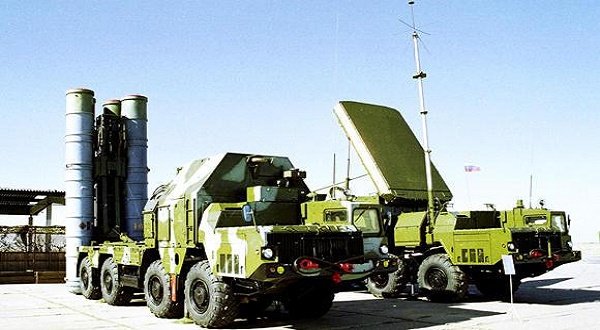
Agencies
MOSCOW — President Vladimir Putin on Monday lifted a ban on supplying Iran with sophisticated S-300 air defense missile systems, the Kremlin said, after Tehran struck a deal with the West over its nuclear program, reported AFP.
A decree signed by Putin removes a ban on “the shipment from Russia to Iran” of the S-300 missiles, the Kremlin said in a statement.
Moscow blocked deliveries of the surface-to-air missiles to Tehran in 2010 after the United Nations slapped sanctions on Iran over its nuclear program barring hi-tech weapons sales. Iran then filed a $4-billion suit against Moscow at an arbitration court in Geneva.
The decision to lift the delivery freeze comes after Tehran and international powers including Russia made a major breakthrough this month by agreeing an outline deal aimed at curbing Iran’s nuclear program.
Meanwhile Israel’s prime minister said he has spoken to Russia’s president to convey his displeasure over Russia’s decision to sell advanced anti-aircraft missiles to Iran.
Benjamin Netanyahu’s office said he spoke with Vladimir Putin today to protest Russia’s planned delivery of advanced S-300 air defense missile systems to the Islamic Republic. Israeli military officials consider the Russian arming of Iran an additional obstacle before any potential military strike against Iran’s nuclear facilities.
Netanyahu said he told Putin the move would only increase Iran’s aggression in the region and undermine security in the Middle East. Israel says the Russian announcement is a direct result of the international community’s framework nuclear deal with Iran. Israel vehemently opposes any deal with Iran that does not dismantle the military capability of its nuclear program.
The Lausanne framework marked a crucial advance in a 12-year standoff between Iran and the West, which disputes Tehran’s denial that it is seeking to build a nuclear bomb.
Global powers must resolve a series of difficult technical issues by a June 30 deadline for a final deal, including the steps for lifting global sanctions imposed on Iran, and lingering questions over the possible military dimensions of its nuclear program.
Iran’s Supreme leader Ayatollah Ali Khamenei has plunged the accord into doubt suggesting that “nothing is binding” while President Hassan Rouhani demanded that sanctions be immediately lifted when any deal is signed.
Despite the dispute over the S-300 missiles, Moscow and Iran have remained on good terms, with Russia agreeing to build new nuclear reactors for Tehran and both sides supporting President Bashar Assad in Syria.

